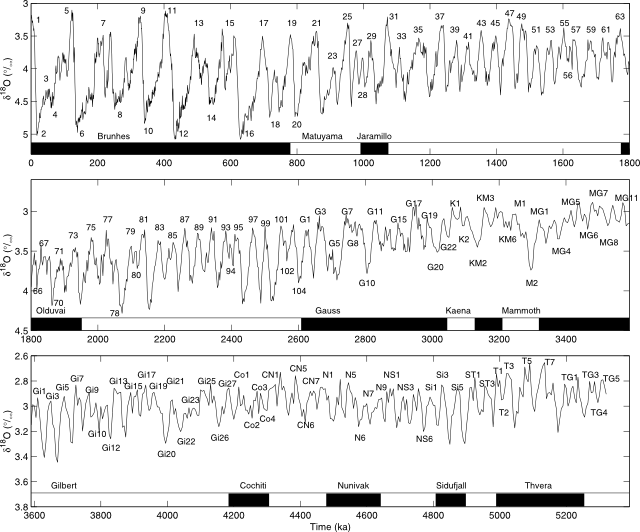There is no significant geomagnetic influence on the cycle of glacials and interglacials. I think the easiest way to determine this is to consider geomagnetic reversals. A reversal obviously involves the largest possible change in the direction of the magnetic field (a full 180°). It also involves some of the largest changes in field intensity, because during a reversal the field intensity drops to a small fraction of its usual value before regrowing to ‘normal’ levels (e.g. Raisbeck et al., 1985). So, if we're expecting geomagnetic field behaviour to have any influence on climate, we'd expect the most obvious effects to appear at reversals.
We can look for this effect by comparing a δ18O record (which gives a proxy for global temperature and ice volume) with a record of magnetic reversals. Here's a figure of the LR04 stack from Lisiecki & Raymo (2005), showing those two records for the past ~5 Myr:

As you can see, nothing spectacular or even noticeable happens at the reversals (the black/white boundaries along the bottom of the plot). They don't seem to correspond to any particular point in the glacial/interglacial cycle.
Of course, it's likely that geomagnetic field strength has some influence on climate, and that these effects are simply swamped by other influences on the spatial and temporal scales we're looking at here. The first possible effect that came to my mind was the geomagnetic field's influence on the amount of incoming cosmic rays, which in turn has an effect on cloud formation. And sure enough, it turns out that Vieira and da Silva (2006) have found such an effect. But I suspect that once you start looking at >10kyr timescales and global signals, such effects get averaged out.
Lisiecki, L. E., & Raymo, M. E. (2005). A Pliocene‐Pleistocene stack of 57 globally distributed benthic δ18O records. Paleoceanography, 20(1).
Raisbeck, G. M., Yiou, F., Bourles, D., & Kent, D. V. (1985). Evidence for an increase in cosmogenic 10Be during a geomagnetic reversal. Nature, 315(6017), 315-317.
Vieira, L. E. A., & da Silva, L. A. (2006). Geomagnetic modulation of clouds effects in the Southern Hemisphere Magnetic Anomaly through lower atmosphere cosmic ray effects. Geophysical research letters, 33(14).
